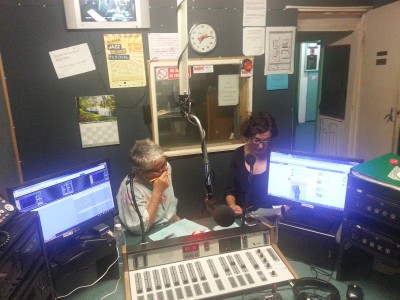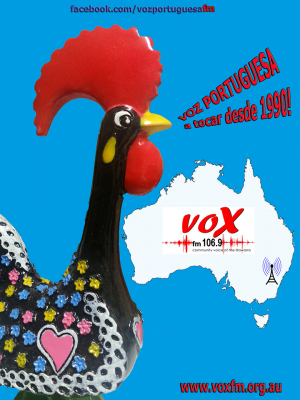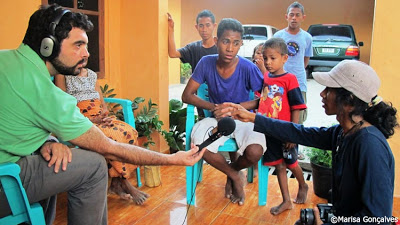On 2014 World Radio Day, established by UNESCO as being 13 February, we chatted with Portuguese journalist Manuel Ribeiro (@manuelribeiro), one of the voices of an Australian radio programme called “Voz Portuguesa” (Portuguese Voice), which has been broadcast since 1990 to the Portuguese-speaking community living in Wollongong in state of New South Wales. It's the largest and oldest community of Portuguese immigrants in Australia. The Australian census indicates that there are 15,328 Portuguese living in Australia nowadays and 46,519 who say they are of Portuguese descent.
Ribeiro explained the role of community radio Vox Fm in this region of Australia and also about his professional experience in radio journalism in East Timor.
Global Voices (GV): Can you tell us a little about the program “Voz Portuguesa”?
Manuel Ribeiro (MR): O programa começou em 1990 por iniciativa de um grupo de portugueses da comunidade local que pretendiam divulgar informação sobre os eventos organizados pelo Kemblawarra Portuguese Sports & Social Club e pela Associação Portuguesa da Costa Sul. Os primeiros imigrantes terão chegado a esta parte da Austrália nos anos 50 para trabalhar na indústria metalúrgica. Actualmente, julgo que a comunidade de Portugueses e luso-descentes nesta área ronde as 5000 pessoas.
Broadcasters of “Voz Portuguesa” in action.
O programa insere-se na rádio Vox FM, uma rádio comunitária de Wollongong cuja programação se divide pelos vários grupos representativos da comunidade, que é cultural e linguísticamente bastante diversa. É uma comunidade multi-cultural vibrante que inclui imigrantes, de vagas posteriores à colonização anglo-saxónica, provenientes, para além de Portugal, de outros países da Europa e, mais recentemente, de países do Médio-Oriente, América Latina e da Ásia.
Manuel Ribeiro (MR): The programme started in 1990 thanks to a group of Portuguese folks from the local community who wanted to disseminate information about the events organized by Kemblawarra Portuguese Sports & Social Club and the Associação Portuguesa da Costa Sul [Portuguese Association from the South Coast]. The first immigrants are known to have arrived to this part of Australia in the 1950s to work in the metal industry. Nowadays, I reckon that between people born in Portugal and people of Portuguese descent, there are about 5,000 individuals in this region.
The program is broadcast on radio Vox FM, a community radio station in Wollongong whose programming is divided into several groups representing this culturally and linguistically diverse community. This is a vibrant multicultural community which includes immigrants who arrived in the country in a subsequent wave of migration after the Anglo-Saxon colonization, and who have come from beyond, not only Portugal but also from other European countries and, more recently, from countries in the Middle East, Latin America and Asia.
GV: What role does your program play in the Portuguese-speaking community? Which audience does it aim for?
Banner of the Vox FM programme “Voz Portuguesa” in Wollongong, NSW, Australia
MR: A “Voz Portuguesa” é um programa semanal de 2 horas que apresenta música em língua portuguesa, notícias locais e de Portugal, um talkshow sobre assuntos de interesse da comunidade, que por vezes inclui entrevistas em estúdio, e informação de agenda sobre eventos locais.
Temos conhecimento que a maior parte dos nossos ouvintes é composta por idosos que querem manter o contacto com a língua portuguesa e ouvir as notícias de Portugal e da comunidade. Alguns não dominam a língua inglesa e, por isso, este é um dos poucos media que falam a sua língua materna. Muitos deles telefonam a pedir músicas que recordam os seus tempos de juventude: música popular, folclore, fados.
Em 2013, a Vox FM iniciou a transmissão via Internet, o que vem expandir a nossa audiência potencial. O nosso objectivo é alargar a audiência a um público mais jovem, da segunda e terceira geração de luso-descendentes. A maioria não fala Português e, por isso, gostaríamos de dar-lhes a conhecer o que se faz em Portugal actualmente, a música e cultura mais contemporâneas. Por outro lado, a presença na Internet permite alcançar um público mais global, que comunica em língua portuguesa, em particular as comunidades timorense e brasileira que vivem noutros pontos da Austrália.
MR: “Voz Portuguesa” is a weekly two-hour program that broadcasts songs in Portuguese, local news and news from Portugal, a talk show on subjects of interest for the community, which sometimes includes interviews taken place in the studio, and information on the local agenda of events.
We know that the majority of our listeners are the elderly who want to keep in touch with the Portuguese language and listen to the news about Portugal and about the community. Some of them do not master the English language, and so they find this to be one of the few media outlets where their native language can be heard. A lot of them ring in to ask for songs that bring memories of their youth: popular songs, folklore, fados.
In 2013, Vox FM started broadcasting via the Internet, a sure expansion of our potential audience. Our goal is to broaden the audience towards the younger demographic of second- and third-generation Portuguese. The majority do not speak Portuguese and that's why we would like to give them the chance to know what goes on in Portugal at the moment, the more contemporary music and culture. On the other hand, the Internet enables us to reach out to a more global public who makes use of the Portuguese language for communication, particularly the East Timorese and the Brazilian communities who live in other regions of Australia.
GV: How would you describe the community radio scene in Australia? Are there any other radio programmes broadcast in Portuguese?
MR: Aqui as rádios comunitárias são bastante populares entre o público australiano porque são consideradas um meio de comunicação alternativo às rádios comerciais. Isso atrai as pessoas, que procuram música e informação de acordo com os seus interesses e backgrounds culturais. Por outro lado, o Estado australiano apoia financeiramente essas iniciativas. Os grupos de filantropia são também muito activos na dinamização de rádios comunitárias.
Para além do nosso programa de rádio, existem na Austrália três outras emissões de rádio ao serviço da comunidade de origem portuguesa no país. A “Rádio Lusitânia” em Adelaide é, tal como a “Voz Portuguesa”, um programa de rádio comunitária ao serviço das comunidades multi-culturais da Austrália, onde a comunidade portuguesa se inclui. A “Portuguese Radio” em Sidney e o programa nacional “SBS Radio Portuguese” são outras estações de rádio direccionadas para as comunidades de língua portuguesa. Por outro lado, a comunidade timorense em Liverpool (Sidney), com bastantes falantes em língua portuguesa, tem um programa de rádio que emite em língua tétum e língua portuguesa.
MR: The community radio stations here are quite popular with the Australian audience because they are seen as an alternative channel of communication to commercial radio. This attracts people searching for music and information to fit their interests and cultural backgrounds. On the other hand, the Australian government supports these initiatives financially. Philanthropy groups are also very active in supporting community radio.
Besides our radio programme, there are three other radio broadcasts in Australia that serve the Portuguese community in the country. “Rádio Lusitânia” in Adelaide is like “Voz Portuguesa” in that it is a community radio programme that is serves the multicultural communities of Australia, where the Portuguese community is included. “Portuguese Radio” in Sydney as well as national programme “SBS Radio Portuguese” are other radio programmes directed to the Portuguese-speaking communities. Moreover, the Timorese community in Liverpool (Sydney), with its large number of Portuguese-speaking people, runs a radio programme that broadcasts in Tetum and in Portuguese.
GV: Have you had any experience with radio in East-Timor as a radio journalist? What is radio's role in that context?
MR: Em 2012, tive a oportunidade de ser correspondente da Deutsche Welle (DW) – Português para África, em Timor-Leste. Foi durante um período crucial para o país, já que nesse ano se realizaram eleições presidenciais e legislativas. Durante a minha estadia pude perceber que existem diversas rádios comunitárias e algumas comerciais, e que existe uma boa cobertura de rádio no país. As pessoas ouvem muita rádio, mais do que vêem televisão ou lêem jornais que ainda não estão acessíveis em todos os distritos. Por esse motivo, a rádio é o meio de comunicação mais importante no país, muitas vezes utilizado pelo estado e instituições não-governamentais para fazer chegar informação de interesse a todos cidadãos.
Manuel Ribeiro, correspondent of DW in East Timor, interviews a local mediator for the repatriation of refugees from West Timor
A minha percepção foi de que estão em curso muitos projectos de desenvolvimento de rádios comunitárias, mas que ainda existe muito trabalho a fazer na área de formação em rádio e melhores condições de funcionamento. Um caso específico que observei de perto foi a rádio local de Oecussi [um enclave na zona ocidental da ilha de Timor], apoiada por uma organização de jornalistas australianos, em termos de equipamento e formação. As falhas prolongadas de electricidade impediam, no entanto, o seu funcionamento regular. Valiam-lhes os vizinhos, as Irmãs da congregação Dominicana, que, esporadicamente, lhes forneciam energia através de um cabo improvisado.
MR: In 2012, I had the chance to work as a correspondent for Deutsche Welle (DW) – Portuguese for Africa in East-Timor. It was during a crucial period for the country, as there were presidential and legislative elections that year. During my stay there, I noticed that there are several community radio stations and some commercial radio stations and that there is good radio coverage in the country. People listen to the radio a lot, more than they watch television or read newspapers, which are still not available in every district. That's why the radio is the most important channel of communication within the country, often used by the government and by NGOs to broadcast information of interest to all citizens.
My perception has been that there are many projects for the development of community radios on the way, but that there is a lot of work still to be done in the area of radio training and improving the funtionality of radio. A specific situation that I could observe closely was local radio in Oecussi [an enclave situated in the western region of the island of Timor], supported by an organization of Australian journalists in terms of equipment and training. However, prolonged electricity failures hindered its regular functioning. Its neighbors, the Dominican Congregation Sisters, came to the rescue. From time to time they provided them with energy by means of a makeshift cable.
GV: From your own perspective, what are the advantages of radio?
MR: O que dá mais prazer em fazer rádio é estar em modo de conversa! Na rádio trata-se cada ouvinte na primeira pessoa e estou consciente que existem pessoas que acompanham o programa de forma fiel. No caso específico da “Voz Portuguesa”, que é emitido a uma hora marcada, isso é comum e é muito gratificante! A rádio consegue manter o que sempre a distinguiu dos outros media. A sua mais-valia é o facto das pessoas sentirem uma maior proximidade com a língua falada e poderem ouvir rádio ao mesmo tempo que fazem outras actividades do dia-a-dia.
MR: What is most pleasurable about radio is to always be in conversation mode! In radio, you treat each listener in the first person, and I am aware there are people who follow the programme faithfully. In the specific case of “Voz Portuguesa”, which is broadcast at a scheduled time, this is something common and quite rewarding! Radio is successful in keeping that which has always been the differential when compared to other media. Its asset is the fact that people feel a greater closeness to the spoken language and can listen to the radio while doing their day-to-day activities.
13 February 2014 – Rap Musicians Take on Guinea-Bissau's Drug
13 February 2014 – Lusofalante: aproximando falantes de uma língua comum através da rádio









